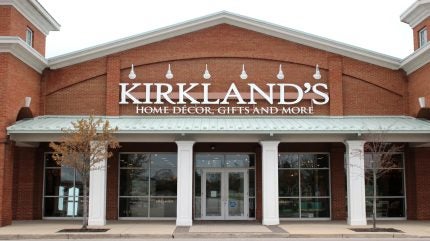
US home decor retail chain Kirkland’s has disclosed strategic adjustments to its operations and management aimed at business transformation, improved efficiency and financial gains as it reports financial results for the first quarter (Q1) of 2025.
The company posted a decrease in net sales to $81.5m in Q1 FY25 from $91.8m in Q1 FY24.

Discover B2B Marketing That Performs
Combine business intelligence and editorial excellence to reach engaged professionals across 36 leading media platforms.
The decline was largely attributed to reduced e-commerce sales, a 5% drop in store count and an 8.9% fall in comparable sales, including a 3.1% decrease in store sales and a 26.7% plummet in e-commerce.
Gross profit for the quarter stood at $20.3m, a downturn from the previous year’s $27.1m. This was mainly due to lower merchandise margins and the deleverage of store occupancy costs, despite a reduction in outbound freight costs.
Operating expenses saw a slight decrease to $30.8m, driven by lower compensation, advertising and consulting costs.
The operating loss for the quarter intensified to $10.5m from $7.5m in the previous year, with an adjusted operating loss of $10m after removing the impact of asset impairment and other non-capitalisable expenses.

US Tariffs are shifting - will you react or anticipate?
Don’t let policy changes catch you off guard. Stay proactive with real-time data and expert analysis.
By GlobalDataNet loss worsened to $11.8m, compared to a loss of $8.8m in Q1 FY24. This was partly due to Beyond acquiring 8.9 million shares of common stock in the company.
Kirkland’s CEO Amy Sullivan stated: “Like many in retail, our first quarter performance was impacted by weather and the continued softness in consumer sentiment. Despite these challenges, we saw improvements in our store performance for the combined March and April period.
“While our e-commerce business remains pressured, and was exacerbated in late May by weather-related disruptions in our Jackson, Tennessee distribution centre, we continue to see momentum in our Kirkland’s Home stores which saw comparable store sales up approximately 3% versus last year for the month of May.”
Earnings before interest, taxes, depreciation, and amortisation (EBITDA) for the quarter was a loss of $8.4m, with an adjusted EBITDA loss of $7.9m after adjustments.
The company’s senior credit agreement was amended, allowing Beyond to increase its stake to 65%. Plans for the sale of the company’s intellectual property to Beyond were announced, pending senior lender approvals.
As part of its transformation strategy, Kirkland’s also announced rebranding to The Brand House Collective, subject to shareholder approval.
As part of a strategic overhaul to become a multi-brand retail operator under the umbrella of The Brand House Collective, Kirkland’s sees an operational reset aimed at reducing the company’s physical presence, enhancing core business processes and establishing a more robust platform for future growth.
The strategy includes consolidating properties and using the closure of underperforming stores to decrease surplus stock, which is expected to lead to quicker inventory turnover and improved asset returns.
Post-consolidation, Kirkland’s plans to maintain 290 stores as the primary infrastructure for its brands, including Kirkland’s Home, Bed Bath & Beyond Home, and Overstock.
In conjunction with these changes, Kirkland’s board of directors has welcomed Eric Schwartzman, Neely Tamminga, Tamara Ward and Steve Woodward as members. All brand and functional leaders within the organisation will now report directly to Amy Sullivan, who holds the dual roles of CEO and chief merchant and creative officer at The Brand House Collective.





